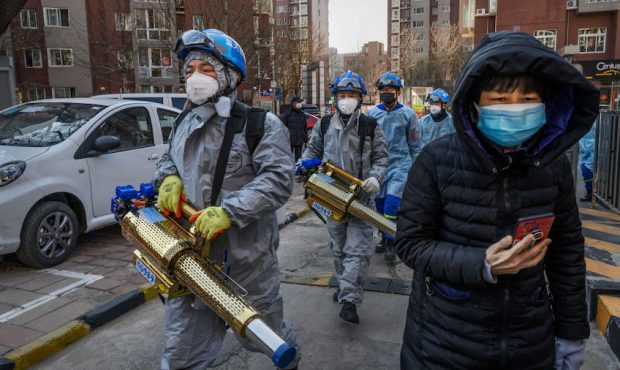As Virus Outbreaks Multiply, UN Declines To Declare Pandemic
Mar 7, 2020, 10:38 AM | Updated: Jun 22, 2022, 3:57 pm

A local resident walks beside Chinese volunteers from Blue Sky Rescue as they wear protective suits and carry fumigation equipment on their way to disinfect common areas of a local residential compound on March 5, 2020 in Beijing, China. Blue Sky Rescue, which is China's largest non-profit rescue NGO, is said to have over 30,000 members and trained to assist in emergencies and natural disasters. The number of cases of the deadly new coronavirus COVID-19 being treated in China dropped to below 26,000 in mainland China Thursday, in what the World Health Organization (WHO) declared a global public health emergency last month. China continued to lock down the city of Wuhan, the epicentre of the virus, in an effort to contain the spread of the pneumonia-like disease. Officials in Beijing have put in place a mandatory 14 day quarantine for all people returning to the capital from other places in China and countries with a large number of cases like South Korea and Japan. The number of those who have died from the virus in China climbed to over 3016 on Thursday, mostly in Hubei province, and cases have been reported in other countries including the United States, Canada, Australia, Japan, South Korea, India, Iran, Italy, the United Kingdom, Germany, France and several others. The World Health Organization has warned all governments to be on alert and raised concerns over a possible pandemic. Some countries, including the United States, have put restrictions on Chinese travellers entering and advised their citizens against travel to China.(Photo by Kevin Frayer/Getty Images)
(Photo by Kevin Frayer/Getty Images)
LONDON (AP) — As cases of the coronavirus surge in Italy, Iran, South Korea, the U.S. and elsewhere, many scientists say it’s plain that the world is in the grips of a pandemic — a serious global outbreak.
The World Health Organization has so far resisted describing the crisis as such, saying the word “pandemic” might spook the world further and lead some countries to lose hope of containing the virus.
“Unless we’re convinced it’s uncontrollable, why (would) we call it a pandemic?” WHO director-general Tedros Adhanom Ghebreyesus said this week.
The U.N. health agency has previously described a pandemic as a situation in which a new virus is causing “sustained community-level outbreaks” in at least two world regions.
Many experts say that threshold has long been met: The virus that was first identified in China is now spreading freely in four regions, it has reached every continent but Antarctica, and its advance seems unavoidable. The disease has managed to gain a foothold and multiply quickly even in countries with relatively strong public health systems.
On Friday, the virus hit a new milestone, infecting more than 100,000 people worldwide, far more than those sickened by SARS, MERS or Ebola in recent years.
“I think it’s pretty clear we’re in a pandemic and I don’t know why WHO is resisting that,” said Michael Osterholm, director of the Center for Infectious Disease Research and Policy at the University of Minnesota.
Experts acknowledge that declaring a pandemic is politically fraught because it can rattle markets, lead to more drastic travel and trade restrictions and stigmatize people coming from affected regions. WHO was previously criticized for labeling the 2009 swine flu outbreak a pandemic. But experts said calling this crisis a pandemic could also spur countries to prepare for the virus’s eventual arrival.
WHO already declared the virus a “global health emergency’ in late January, putting countries and humanitarian organizations on notice and issuing a broad set of recommendations to curb its spread.
Even in countries that moved quickly to shut down their links to China, COVID-19 has managed to sneak in. Within a matter of weeks, officials in Italy, Iran and South Korea went from reporting single new cases to hundreds.
“We were the first country to stop flights to China and we were completely surprised by this disease,” said Massimo Galli, an infectious-diseases professor at the University of Milan. “It’s dangerous for the entire world that the virus is able to spread underground like this.”
With more than 3,800 cases, Italy is the epicenter of Europe’s outbreak and has shut down schools, closed sports stadiums to fans and urged the elderly not to go outside unless absolutely necessary. But it has still exported cases of the virus to at least 10 countries, including Austria, the Czech Republic, Spain, South Africa and Nigeria.
Devi Sridhar, a professor of global public health at the University of Edinburgh who co-chaired a review of WHO’s response to the 2014-16 Ebola outbreak in West Africa, said a pandemic declaration is long overdue.
“This outbreak meets all the definitions for a pandemic that we had pre-coronavirus,” she said.
At a news conference last month, Dr. Mike Ryan, WHO’s emergencies chief, said a pandemic is “a unique situation in which we believe that all citizens on the planet” will likely be exposed to a virus “within a defined period of time.”
Several experts said they hadn’t heard that definition. The U.S. Centers for Disease Control and Prevention, for its part, defines a pandemic as “an epidemic that has spread over several countries or continents, usually affecting a large number of people.”
The Associated Press receives support for health and science coverage from the Howard Hughes Medical Institute’s Department of Science Education. The AP is solely responsible for all content.












